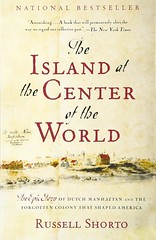
PREV ARTICLE
NEXT ARTICLE
FULL ISSUE
PREV FULL ISSUE
BOOK REVIEWS: U.S. COLONIAL ERAJust as decent numismatic books like Coins and Currency: An Historical Encyclopedia can sometimes be found outside numismatic circles, so too can interesting and useful numismatic facts be found in a whole spectrum of non-numismatic books. Jack Howes is the President of the Colonial Coin Collectors Club (C4), and he reviewed some useful non-numismatic books in his "President's Corner" column in the Spring 2019 issue of The C4 Newsletter. -Editor
My interest in colonial coins and related stuff began as an adjunct to reading the history of the period. I find interesting parts in the whole of the period from Columbus to the Revolutionary War and its aftermath. I collected coins when I was young, typical stuff, Lincoln pennies, Jefferson nickels, etc. As is common, I lost interest when I got to high school. I got reinterested in coinage of the colonial period only after finding my way back to the history. Perhaps, I like being able to touch history. But my main point here is that I continue to read the history and I find that keeps me engaged. I have some suggestions for those looking for a way into the history of the period. Sometimes history books can be a hard slog and I have read my share of those kinds of books. I tend not to finish those or read only parts for a specific area I am studying. But there are others that are good reads from start to finish. Sometimes those books are not strictly history but rather historical fiction -- but so what.
For example, did you know that the American troops involved in the Yorktown siege were rarely paid and when they did get paid it could be in different currencies?... From Morris’s perspective, the most important part of the news about de Grasse’s in the Chesapeake was knowing the admiral had the 500,000 pesos collected by Saavedra in Havana. With that amount of money waiting for the French army in Virginia, Rochambeau was now willing to loan Morris the twenty-five thousand dollars in coins needed to pay Washington’s soldiers. Not only were the French providing the United States with a navy, they were paying its army. The day after Washington reached out to Morris, kegs of silver dollars began to arrive at Head of Elk. The soldiers watched in wonder as the paymaster knocked the heads off the barrels and the coins spilled out across the ground. “I received the only pay that I ever drew for my service during the war,” thirteen-year-old private John Hudson of the First New York Regiment later remembered, “six French crowns.” [Philbrick, In the Hurricane’s Eye, pp. 174-175.]
I am interested in hearing from members about books they liked or good reads they think I have missed! Email me or find me at the C4 convention in the fall. Many thanks to Jack Howes and C4 for permission to republish this article here. If anyone has comments or questions for Jack I'll gladly forward them. I've also read Island at the Center of the World; it provides a great perspective on New York's role in the world and its impact on the success of the nation. I often save newspaper and magazine articles for our college student son. I've told him, "You are what you eat, and this is some food for your brain." I asked him once, "How long does it take to write a tweet or Facebook post?" Minutes. "How long does it take to write a magazine article?" At least a month, and sometimes several months. "How long does it take to write a book?" Books are typically the result of years of the author's toil and sweat, experience and insight. So which has the most nutrition for your brain? -Editor
For more information about the Colonial Coins Collectors Club (C4), see:

Wayne Homren, Editor The Numismatic Bibliomania Society is a non-profit organization promoting numismatic literature. See our web site at coinbooks.org. To submit items for publication in The E-Sylum, write to the Editor at this address: whomren@gmail.com To subscribe go to: https://my.binhost.com/lists/listinfo/esylum All Rights Reserved. NBS Home Page Contact the NBS webmaster 
|


